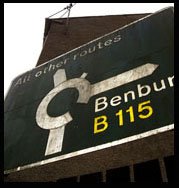Sir Kenneth Bloomfield Addresses the ‘Misgovernment’ and Missed Opportunities of Northern Irish Rule
by ARIELLE EMMETT, special to the Armagh Examiner
by ARIELLE EMMETT, special to the Armagh Examiner
 ARMAGH, JULY 23. We met with Sir Kenneth Bloomfield, the former Head of Northern Ireland’s Civil Service and also the country’s Victims’ Commissioner, as he gave a talk about new Irish identities at the John Hewitt International Summer School.
ARMAGH, JULY 23. We met with Sir Kenneth Bloomfield, the former Head of Northern Ireland’s Civil Service and also the country’s Victims’ Commissioner, as he gave a talk about new Irish identities at the John Hewitt International Summer School.Bloomfield, a white-haired scholar, is all worry and humor crossing his handsome Anglo-Irish face. He has worked closely with successive Prime Ministers of Northern Ireland throughout the “troubles,” and finds himself confronting government intransigence and Catholic-Protestant violence with a sense of unease and hope.
“Ever since the Good Friday agreement, we’ve been agonizing, ‘Is it over yet?’” he said. During a talk featuring perspectives from his new book, A Tragedy of Errors: The Government and Misgovernment of Northern Ireland (Liverpool University Press, 2007). Bloomfield expressed sadness about earlier missed opportunities for Catholic-Protestant reconciliation and power-sharing. He wonders why Northern Irish majority leaders rejected outright even modest initiatives in the 1970s, 80s, and 90s to bring Catholics greater government representation and civil rights.
“Will things destabilize or will they devolve [peacefully]?” he asked a packed crowd of listeners. "I'm not optimistic." But Bloomfield, who was raised in the Protestant church but found himself linked by blood to a Catholic woman who lived centuries ago on the Shannon River, hopes scores of issues – including victims’ rights and economic opportunity – will eventually be settled.
“There is a sense here of feeling more and more alienated from England, yet we also feel a distance from the 26 counties of the Republic of Ireland who are so elated by their new-found prosperity,” he observed. A clear Northern Irish identity is emerging, says Bloomfield, whose own home was once bombed by the IRA. That identity is growing stronger in the wake of disappointing interactions with the British government, and exists even with the uncertainty that the bloody enmities of the past are indeed over.
In May 2007, the four political parties of Northern Ireland announced a landmark power-sharing agreement enabling both the Protestant majority and Catholic minority to join a 12-member administration that took control of Ulster’s government departments from Britain. Although the agreement was the central goal of the US-brokered “Good Friday” accord of 1998, it took nearly a decade to bring the leaders of the two highly polarized Protestant and Catholic parties together. Northern Irish audiences were stunned when Protestant evangelist Ian Paisley, 81, head of the Democratic Unionist party, and Martin McGuinness, 56, Sinn Fein deputy leader and former deputy commander of the outlawed Irish Republican Army, smiled beside each other as they announced the new accord.
A Plea for Victims
But power sharing does not make all the problems of this nation go away. Bloomfield is concerned that Northern Ireland must achieve a high level of government services and competence. He argued that government should address economic disparities among the working poor, Catholic or Protestant. “Many of those currently in office have no previous experience in office,” he noted. “We have a right to seek good service in Northern Irish government as we had from Great Britain.”
The future direction of the country remains open-ended, he said. The notion of direct rule in Ulster – a quasi colonial rule by Britain – is distasteful to Bloomfield and many Northern Irish. “The Protestant working class community has become more demoralized and we’re sufficiently “devolved” [separated] from Britain that we’ve developed a separate identity.” At the same time, Northern Ireland could seek union with its brethren to the South, creating a united Irish state. However, he said, “unity, like childbirth, is not to be achieved without pain.” More imagination is needed – for example, a “devolved’ and independent Northern Irish state that develops closer economic ties with Southern Ireland, encouraging industry, culture, and high technology to cross borders.
One of the most important and troubling challenges is resolving victims’ claims from the troubles. “We can’t go forward until we address the victims,” he said. “The perpetrators are often considered victims and the government pays them from the same purse.” This solution can’t stand, Bloomfield insists. But finding the right balance of clemency, punishment, and government financial support isn’t easy, either. When a reporter asked Bloomfield if Northern Ireland should consider the South African model of reconciliation -- hearings that allow victims to confront the perpetrators of violent crimes -- he noted that the numbers of crimes in Ulster were daunting. "Any victims not participating in the hearings would feel left out," he said, acknowledging anger and divisiveness here still run deep.
Bloomfield is not sure how reconcilation or fair compensation for victims should play out.
“In the future, thousands will live under the shadows [of the troubles], and we must never forget them,” he said.
Arielle Emmett is professor of storytelling in the Armagh Project.
